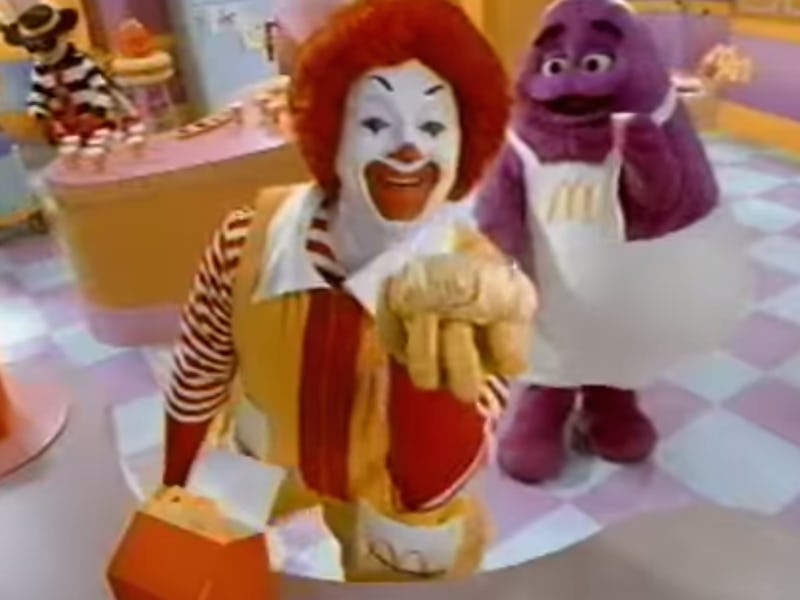McDonald's Is Closing Locations. That's Worse News than You Probably Think.
It's a stealth community center for millions.

McDonald’s says it’s done issuing monthly sales reports after May’s numbers. The company’s business dipped again despite swapping the Hamburglar’s prison stripes for a pair of skinny jeans; its stock price has basically stalled since late 2011. The burger behemoth you hate to love will be closing hundreds of stores over the next year.
I’d like to say this is a win for children’s diets, for public health generally, for the good of America. It should tickle anyone who’s pro-home cooking and anti-diabetes. But on balance, this may not be such a good thing. Because many of the people who go to McDonald’s are people who, while they may deserve better, still need something like a McDonald’s in their life.
This is a tough thing to grasp, if you happen to grow up with a lot of options for food and for meeting spaces. I didn’t. The town of Orion, a scrub of a country berg in rural Illinois, didn’t have a McDonald’s. Our gathering place happened to be a Pizza Hut. I understand that in the years since I left for college the population has boomed to 1,847, enough to support a Subway as well, but in my formative years the town’s dining options were limited to the Hut, a bowling alley diner, and a supper club. The latter two have since closed. Pizza Hut was our community meeting place, arcade, date-night rendezvous point, post-game celebration hall, employer of students, and just about anything else the town required under one red roof.
I recently dropped by a Mickey D’s in the bustling village of Maquoketa, Iowa (pop. 6,062). There, in shades of Orion, the Golden Arches are where senior citizens get a cheap cup of coffee and have a place to talk. There was the mom with four kids in tow hustling to feed her family and, from what I could see sneaking peeks at the register, making it out for under $17.
You see a lot of families, actually, at McDonald’s, here or anywhere else. The median household income in Maquoketa isn’t much more than $30k, and a lot of that is earned with long hours and manual labor. If you can feed a family for under twenty bucks in the few moments you have between dropping the kids off at school, going to work, picking them up after, doing the household chores, and handling all the other unplanned shit that arises in the course of human events, it’s a small victory. Yet even self-styled man-of-the-world Anthony Bourdain looks down on some quick burgers, going out of his way to convince his daughter that McDonald’s is responsible for [child abductions](http://www.theguardian.com/lifeandstyle/2010/jun/12/anthony-bourdain-war-fast-food, and he’s a guy who’s bragged about eating [fermented shark] (http://www.theexpeditioner.com/2011/06/16/my-encounter-with-hakarl-the-worst-tasting-food-on-earth/). They may be one of the largest corporations in America, but their customers tend to be people who are just getting by, doing their thing. On cold nights, you see homeless people getting shelter for the cost of a cup of coffee. At any hour, you see shift laborers, the working weary, getting fuel for the next clock-punch. Taking a swipe at McDonald’s is to impugn customers whose proper response might be, “What else do you expect me to do?”
And that, I think, is the tipoff that ripping McDonald’s, or gloating over its recent contraction, is foremost about the country’s struggle with obesity. Foodies embrace eating calorie-intense dishes of butter and marrow and drippings; they just don’t embrace the trappings or even the little treats available to the poor. You almost never hear anyone shit talk a $50-a-plate bistro, no matter how many calories are in that fondue appetizer. None of those have a dollar menu.
McDonald’s tried introducing more upscale items like you’d find at Chipotle — a chain praised by McDonald’s critics as an example of fast food done right. Only McDonald’s customers didn’t buy it. A $5 burger — five lousy dollars — was too pricey.
It’d be great if every family was able to afford healthy food for their children, in Iowa or in Manhattan or anywhere else in America. That’s a goal worth working towards. But first, let’s just make sure those kids get to eat at all.